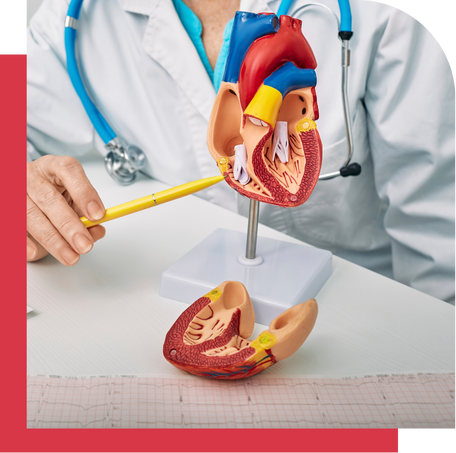Expertise
Pre-operative Cardiac Consultation

If you have an existing heart condition or risk factors such as high blood pressure, diabetes, or family history of heart disease, it’s crucial to ensure your heart is healthy enough to undergo a surgical procedure. A comprehensive cardiac evaluation can significantly reduce the risk of complications during and after surgery.
Under the expert guidance of Dr. C.S. Aravind, our pre-operative cardiac consultation involves a detailed assessment of your heart’s function, reviewing any underlying cardiovascular issues, and providing recommendations to optimize your heart health before surgery.
What Is a Pre-operative Cardiac Consultation?
A pre-operative cardiac consultation is a detailed evaluation of your heart’s health to determine if you are fit to undergo surgery. This assessment is especially important for patients with known heart conditions or those undergoing major surgeries such as orthopedic, abdominal, or thoracic procedures. The consultation helps identify potential risks, allowing Dr. C.S. Aravind to manage any heart-related concerns before your surgery.
Who Needs a Pre-operative Cardiac Consultation?
During the test, small electrodes are placed on your chest, arms, and legs. These electrodes detect the electrical signals from your heart and send them to a machine that records your heart’s activity. The entire test usually takes about 5 to 10 minutes and is completely painless. Once the test is completed, Dr. C.S. Aravind will review the results and discuss any abnormalities or follow-up treatments if needed.
Who Needs a Pre-operative Cardiac Consultation?
A pre-operative cardiac evaluation is recommended for individuals who:
- Have a history of heart disease, angina, or heart attack
- Suffer from conditions such as hypertension, diabetes, or high cholesterol
- Are undergoing major surgeries that require general anesthesia
- Have a family history of cardiovascular disease
- Experience symptoms such as chest pain, shortness of breath, or irregular heartbeats
What Does the Consultation Involve?
During your pre-operative cardiac consultation, Dr. C.S. Aravind will perform the following:
- Medical History Review: A detailed discussion about your heart history, existing medical conditions, and any previous surgeries or heart procedures.
- Physical Examination: A thorough examination to assess your heart’s condition, including checking for signs of heart failure, irregular rhythms, or other issues.
- Diagnostic Tests: Depending on your risk factors, additional tests such as ECG, ECHO, TMT, or HOLTER monitoring may be recommended to assess the heart’s electrical activity and structure.
- Risk Assessment: Dr. Aravind will evaluate the risk of any cardiac events occurring during surgery and recommend steps to minimize those risks.
- Medication Review: Your current medications will be reviewed to determine if any adjustments are necessary before surgery.
Why Is Pre-operative Cardiac Consultation Important?
Surgery, especially when it involves general anesthesia, puts stress on your heart and circulatory system. For patients with underlying heart conditions, this stress can lead to complications such as arrhythmias, heart attacks, or heart failure during or after surgery. A pre-operative cardiac consultation helps:
- Assess Surgical Risk: Identifies any potential heart-related risks associated with your upcoming surgery.
- Optimize Heart Health: Ensures your heart is in the best possible condition before surgery, reducing complications.
- Tailored Surgical Plan: Allows for a personalized surgical plan, including adjustments to medications or treatments to safeguard your heart.
What Happens After the Consultation?
Based on the findings of the consultation, Dr. C.S. Aravind will provide recommendations to improve your heart health before surgery. This may include adjusting medications, performing additional tests, or, in some cases, delaying surgery until your heart is better prepared. In cases where the surgery must proceed, specific precautions will be advised to minimize cardiac risks.